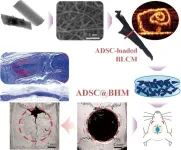(Press-News.org) Screens have become ubiquitous in our daily lives — which means they’ve also become part of children’s lives too. So what effect does this have on children’s developing brains, especially critical language skills? To understand this, scientists in Estonia surveyed the parents of more than 400 children about their screen use, their children’s screen use, and their children’s language skills. They found that parents who use screens a lot also have children who use screens a lot, and that children’s higher screen time is associated with poorer language skills.
“Our study reveals that children’s screen use patterns are similar to those of their parents,” said Dr Tiia Tulviste of the University of Tartu, lead author of the study in Frontiers in Developmental Psychology. “Child language researchers emphasize the importance of everyday interactions with adults in early language development, where children are actively involved. At the same time, we know that all family members tend to their screen devices. Because time is finite, we need to find out how this fierce competition between face-to-face interaction and screen time affects child language development.”
Talking or technology
In many cultures, most of children’s language development occurs because they talk to adults: having conversations exposes them to more vocabulary and grammatical structures. The presence of screens can disrupt this, especially if an adult is being interrupted by texts or notifications. But understanding how this affects children’s development requires accounting for the different types of screen children may be using and what they’re using them for, as well as the screens that adults around them use.
Tulviste and co-investigator Dr Jaan Tulviste surveyed a representative sample of Estonian families, including 421 children aged between two and a half and four years old. The survey asked parents to estimate how long each member of the family would spend using different screen devices for different purposes on a typical weekend day. It also asked how much of this time would be spent using a screen as a family, for example watching a film together. Finally, parents were asked to fill out a questionnaire evaluating their children’s language ability.
The researchers sorted both children and adults into three screen use groups — high, low, and moderate. They then analyzed this data to see if there was a link between parental screen use and children’s screen use. They found that parents and children generally belonged to the same groups: parents who used screens a lot had children who also used screens a lot. Controlling for age, they looked at the language development of these children, and found that children who used screens less scored higher for both grammar and vocabulary. No form of screen use had a positive effect on children’s language skills.
“While reading ebooks and playing some educational games may offer language learning opportunities, especially for older children, research shows that during the first years of life, the most influential factor is everyday dyadic face-to-face parent-child verbal interaction,” said Tulviste.
Fun and games?
Using screens for videogames had a notable negative effect on children’s language skills, regardless of whether parents or children were gaming. Tulviste explained cultural factors could be involved in this result: “For Estonian children, few developmentally appropriate computer games exist for this age group. Games in a foreign language with limited interactivity or visual-only content likely do not provide rich opportunities for learning oral language and communication skills.”
The authors pointed out that more research will need to be done to understand how the pandemic has affected these patterns: they originally collected their data in 2019. It would also be important to learn how these whole-family profiles change over time, using longitudinal studies that follow families as children grow up.
“The study has a cross-sectional design — we studied each participant only once and did not follow their developmental trajectory over a longer time period,” cautioned Tulviste. “Also, the data were collected before the Covid-19 pandemic. It will be interesting to look at future research findings addressing language development and the impact of screen use during the pandemic.”
END
Kids in families with too much screen time struggle with language skills
Scientists find that children whose families use screens a lot have weaker vocabulary skills — and videogames have the biggest negative effect
2024-09-12
ELSE PRESS RELEASES FROM THIS DATE:
Medical College of Georgia scientists searching for new treatment target for diabetic retinopathy
2024-09-12
Scientists at the Medical College of Georgia at Augusta University are searching for a new treatment target for a common complication of diabetes that can cause retinal blood vessels to break down, leak, or become blocked.
Diabetic retinopathy is a serious eye disease and a leading cause of blindness that results when diabetes’ sustained high blood sugar levels cause damage to the retina – the part of the eye that detects light – over time. That can happen in a number of ways, from inflammation to overgrowth ...
High doses of some prescription stimulants tied to increased psychosis risk
2024-09-12
Prescribing rates for stimulants that treat attention-deficit/hyperactivity disorder (ADHD) have increased significantly over the past decade, with some of the largest increases reported during the COVID-19 pandemic. A new study of adult emergency department admissions at Mass General Brigham, led by McLean Hospital researchers, found that individuals who are taking high doses of amphetamine (e.g. Adderall) face more than a five-fold increased risk for developing psychosis or mania. Findings were published September 12th in the American Journal of Psychiatry.
Overall, individuals with past-month prescription amphetamine use had a greater likelihood of new-onset psychosis or mania ...
New national survey shows hesitancy about vaccines this fall
2024-09-12
With flu season just around the corner and COVID-19 cases on the rise, a new nationwide survey from The Ohio State University Wexner Medical Center reveals hesitancy around vaccines this fall. The new data comes just as this year’s flu shot rolls out and following the FDA’s approval of an updated round of COVID-19 vaccines.
The national poll of 1,006 people found more than one-third (37%) have gotten vaccines in the past but do not plan to this year. The same percent of respondents said they don’t need any of the vaccines surveyed in the poll, including flu, COVID-19, pneumococcal and respiratory ...
Revolutionary tubular scaffolds boost stem cell-driven bone regeneration in skull defects
2024-09-12
Scientists from Sun Yat-sen University's School of Biomedical Engineering have developed groundbreaking tubular scaffolds made from electrospun membranes, which significantly enhance bone regeneration in critical skull defects. These scaffolds, designed to mimic natural bone structures, create an ideal environment for adipose-derived stem cells (rADSCs) to thrive and accelerate healing. By integrating advanced materials like polycaprolactone, PLGA, and nano-hydroxyapatite, the researchers achieved remarkable results in both lab and animal studies, ...
UTokyo attosecond institute welcomes Nobel laureate
2024-09-12
Nobel laureate Pierre Agostini, winner of the 2023 prize in physics, will headline a special two-day event hosted by the University of Tokyo on Sept. 26-27. The keynote lecture by Agostini, renowned for this pioneering work in attosecond science, will be part of a larger symposium bringing together researchers from around the world to celebrate the university’s planned Attosecond Laser Facility (ALFA), and discuss the latest developments and future directions of attosecond science.
Have you taken a photo of a fast-moving animal or vehicle and noticed how blurry the subject can be? This is likely because the faster a moving subject is, the faster the camera’s shutter needs ...
Single dose of mpox vaccine effective in preventing infection, study finds
2024-09-11
Toronto, ON, September 11, 2024 — A single dose of the Modified vaccinia Ankara-Bavarian Nordic (MVA-BN) was 58% effective in protecting again mpox infection, according to a new study published in BMJ.
Researchers from ICES, Public Health Ontario, and the MAP Centre for Urban Health Solutions at St. Michael’s Hospital of Unity Health Toronto have conducted a target trial emulation to estimate the effectiveness of the mpox vaccine.
During the mpox outbreak in 2022, Ontario, Canada introduced the vaccine ...
One dose of smallpox vaccine moderately effective in preventing mpox infection
2024-09-11
One dose of modified vaccinia Ankara-Bavarian Nordic (MVA-BN) smallpox vaccine is moderately effective in preventing mpox infection and should be made available to communities at risk, finds a study published by The BMJ today.
With mpox infections rising again across the globe, the researchers say these findings “strengthen the evidence that MVA-BN is effective at preventing mpox infection and should be made available and accessible to communities at risk.”
No randomised clinical trials of vaccination against mpox have been conducted. Estimates of the effectiveness of a single dose of vaccination from observational studies range from ...
More than half of UK government nutrition advisors are paid by food companies
2024-09-11
More than half of the experts on the UK government’s nutrition advisory panel have links to the food industry, reveals an investigation by The BMJ today.
At least 11 of the 17 members of the Scientific Advisory Committee on Nutrition (SACN) have conflicts of interest with the likes of Nestle, sugar manufacturer Tate and Lyle, and the world’s largest ice cream producer, Unilever, reports freelance journalist Sophie Borland.
And at least six out of the 11 members of SACN’s Subgroup on Maternal and Child Nutrition have ties to food firms, including baby food manufacturers and formula milk brands.
SACN ...
Shorter-course radiation better option for breast cancer patients than conventional schedule
2024-09-11
Giving higher doses per fraction of radiation therapy over a shorter time after breast cancer surgery significantly reduces the risk of side effects and improves quality of life compared with a conventional schedule, finds a study published by The BMJ today.
Although survival and recurrence rates were similar, this approach, known as hypofractionation, is safer, more convenient for patients, and reduces costs for healthcare systems, and should be the preferred treatment option, say the researchers.
Conventional fractionation radiation therapy has been the standard of care for most patients with breast ...
Obesity treatments being restricted by cash poor local services
2024-09-11
Obesity treatments are being restricted by cash poor local services across England with many patients being denied specialist drugs, surgery and support, an investigation by The BMJ has found.
Patients in nearly half the country can’t get appointments with specialist teams for weight loss support and care, including treatment with drugs such as semaglutide. And in nearly one in five local health areas, patients don’t have access to a bariatric surgery service, reports Elisabeth Mahase.
The government estimates that obesity costs the NHS in England around £6.5bn a year and is the second biggest preventable cause ...
LAST 30 PRESS RELEASES:
Fecal transplants from older mice significantly improve ovarian function and fertility in younger mice
Delight for diastereomer production: A novel strategy for organic chemistry
Permafrost is key to carbon storage. That makes northern wildfires even more dangerous
Hairdressers could be a secret weapon in tackling climate change, new research finds
Genetic risk for mental illness is far less disorder-specific than clinicians have assumed, massive Swedish study reveals
A therapeutic target that would curb the spread of coronaviruses has been identified
Modern twist on wildfire management methods found also to have a bonus feature that protects water supplies
AI enables defect-aware prediction of metal 3D-printed part quality
Miniscule fossil discovery reveals fresh clues into the evolution of the earliest-known relative of all primates
World Water Day 2026: Applied Microbiology International to hold Gender Equality and Water webinar
The unprecedented transformation in energy: The Third Energy Revolution toward carbon neutrality
Building on the far side: AI analysis suggests sturdier foundation for future lunar bases
Far-field superresolution imaging via k-space superoscillation
10 Years, 70% shift: Wastewater upgrades quietly transform river microbiomes
Why does chronic back pain make everyday sounds feel harsher? Brain imaging study points to a treatable cause
Video messaging effectiveness depends on quality of streaming experience, research shows
Introducing the “bloom” cycle, or why plants are not stupid
The Lancet Oncology: Breast cancer remains the most common cancer among women worldwide, with annual cases expected to reach over 3.5 million by 2050
Improve education and transitional support for autistic people to prevent death by suicide, say experts
GLP-1 drugs like Ozempic could cut risk of major heart complications after heart attack, study finds
Study finds Earth may have twice as many vertebrate species as previously thought
NYU Langone orthopedic surgeons present latest clinical findings and research at AAOS 2026
New journal highlights how artificial intelligence can help solve global environmental crises
Study identifies three diverging global AI pathways shaping the future of technology and governance
Machine learning advances non targeted detection of environmental pollutants
ACP advises all adults 75 or older get a protein subunit RSV vaccine
New study finds earliest evidence of big land predators hunting plant-eaters
Newer groundwater associated with higher risk of Parkinson’s disease
New study identifies growth hormone receptor as possible target to improve lung cancer treatment
Routine helps children adjust to school, but harsh parenting may undo benefits
[Press-News.org] Kids in families with too much screen time struggle with language skillsScientists find that children whose families use screens a lot have weaker vocabulary skills — and videogames have the biggest negative effect


